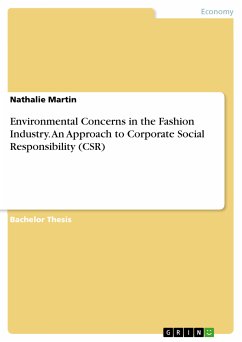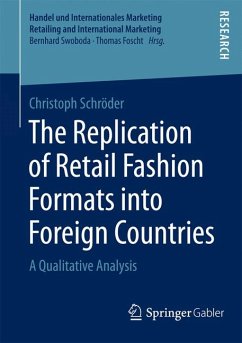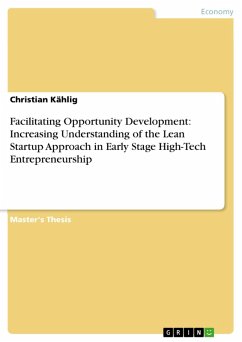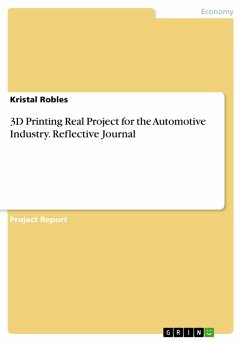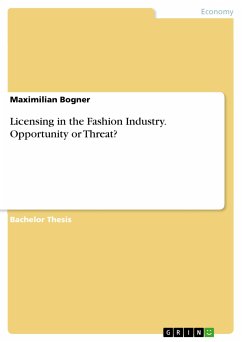
Licensing in the Fashion Industry. Opportunity or Threat? (eBook, PDF)
Sofort per Download lieferbar
Statt: 29,90 €**
18,99 €
inkl. MwSt. und vom Verlag festgesetzt.
**Preis der gedruckten Ausgabe (Broschiertes Buch)
Alle Infos zum eBook verschenkenWeitere Ausgaben:

PAYBACK Punkte
0 °P sammeln!
Bachelor Thesis from the year 2017 in the subject Business economics - Offline Marketing and Online Marketing, grade: 2.1, European Business School - International University Schloß Reichartshausen Oestrich-Winkel, language: English, abstract: A topic, which is regarded as a crucial and effective tool for fashion brands, is licensing. The licensing industry has turned out to be a very profitable and high-sales generating business segment. The Licensing Industry Merchandiser's Association (LIMA) states, that the total licensing industry's market revenue accounted for more than 5,9 billion doll...
Bachelor Thesis from the year 2017 in the subject Business economics - Offline Marketing and Online Marketing, grade: 2.1, European Business School - International University Schloß Reichartshausen Oestrich-Winkel, language: English, abstract: A topic, which is regarded as a crucial and effective tool for fashion brands, is licensing. The licensing industry has turned out to be a very profitable and high-sales generating business segment. The Licensing Industry Merchandiser's Association (LIMA) states, that the total licensing industry's market revenue accounted for more than 5,9 billion dollars in 2007. These figures, however, only include the revenue, which has been created only from licensing fees and royalties, paid as compensation to brand owners. The present sales figures for licensed products in the fashion and apparel industry underline the presence and effectiveness of this marketing tool. The entire fashion and apparel industry's sales volume for licensed products is more than 80 billion dollars. The totals sales volume of licensed products in German-speaking countries, including Germany, Austria and Switzerland, was approximately 22,4 billion Euro in 2005. This shows that more than a quarter of annual sales in the European fashion industry are generated in those countries. Due to the fact, that most of the sales were generated with products arising from brand licensing agreements, brand owners see the biggest potential for growth in brand licensing agreements. Additionally, growth expectations arise from the increasing number of contracts and market volume. The number of brand licensing contracts, which were signed in Germany, grew from 750 contracts with a market share of more than 6 billion Euro, to a current number of over 1.000 brand licensing agreements with a total market volume of over 8.5 billion Euro in licensing fees. The objective of this thesis is to analyze how brands develop and act in the fashion industry. In this context it is crucial to provide a clear overview of the fashion industry and the brand operation in this special industry. The main objective of this thesis will be the examination of how and to what extent companies and brands operating in the fashion industry use licensing. Examining the opportunities and threats arising for brands entering licensing agreements, this thesis will provide an explanation about the motivation for brands, especially in the fashion industry, to enter licensing agreements. After reading this thesis, the reader should be able to evaluate the advantages or disadvantages of licensing in the fashion industry and have a broad understanding of the importance of licensing for this industry in the past, present and future.
Dieser Download kann aus rechtlichen Gründen nur mit Rechnungsadresse in A, B, BG, CY, CZ, D, DK, EW, E, FIN, F, GR, HR, H, IRL, I, LT, L, LR, M, NL, PL, P, R, S, SLO, SK ausgeliefert werden.






